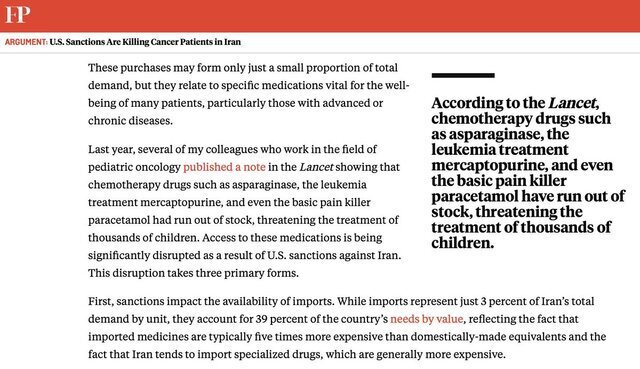That U.S. sanctions are harming Iranians patients is not a mythology: Foreign Policy

In an article published by Foreign Policy on Wednesday, it has been illustrated that how sanctions are taking tolls Iranian patients.
The article, written by Abbas Kebriaeezadeh, shows that the U.S. sanctions on patients are not “mythology”.
Iranian Foreign Minister Mohammad Javad Zarif has also said the United States officials can read the effects of sanctions on Iranian patients in their own media, referring them to a report by the Foreign policy published on August 14.
“Don't take it just from me: Foreign Policy illustrates one impact of the Trump administration's economic terrorism on Iranians; from those directly involved in producing medicine for cancer patients,” Zarif tweeted on Friday.
The article, headlined “U.S. Sanctions Are Killing Cancer Patients in Iran”, said, “Last month, the U.S. Department of State released a video addressed to the people of Iran. In the video, Trump administration official Brian Hook claims that it is a “myth” that sanctions target Iran’s access to medicine… Our findings make clear that the harms being inflicted on Iranian patients are not mythology.”
It is said that the U.S. sanctions function as a tool of economic war in practice and have “serious detrimental impact on the health and lives” of Iranians individuals.
“Under U.S. President Donald Trump, the situation has gotten worse. Census Bureau data shows that the United States exported an average of $26 million of pharmaceutical products to Iran annually during the Barack Obama-era sanctions. Exports have averaged just $8.6 million a year in the last two years under the more draconian sanctions policies of Trump,” the article said.
It added that the Trump administration has made it more difficult for European countries to export medicine to Iran.
"According to the Lancet, chemotherapy drugs such as asparaginase, the leukemia treatment mercaptopurine, and even the basic pain killer paracetamol have run out of stock, threatening the treatment of thousands of children."
“Last year, several of my colleagues who work in the field of pediatric oncology published a note in the Lancet showing that chemotherapy drugs such as asparaginase, the leukemia treatment mercaptopurine, and even the basic pain killer paracetamol had run out of stock, threatening the treatment of thousands of children. Access to these medications is being significantly disrupted as a result of U.S. sanctions against Iran,” says the writer.
Iran’s Health Minister Saeed Namaki said on August 5 that the U.S. sanctions are “crime against humanity”.
“The U.S. administration’s actions in sanctioning medicine that the Iranian patients need, and Washington’s pressure in the area of health are crime against humanity,” he said in a joint press conference with Lebanese Health Minister Jamil Jabak in Tehran.
Namaki also said the U.S. sanctions in the area of medicine are “illogical” and “inhumane”.
President Hassan Rouhani said in June that the U.S. sanctions against Iran constitute examples of “crime against humanity and economic terrorism” because they have targeted ordinary people’s “lives and needs”.
“It should not be said that the U.S. has imposed sanctions on us, because they are not sanctions. They are ‘crime against humanity’. They could be called sanctions if they targeted some of our sensitive industries, but they are crime against humanity and economic terrorism when they target the people’s lives and needs,” he said in a cabinet meeting.
Kianoush Jahanpour, spokesman for Iran’s Food and Drug Administration, told ISNA in an interview published on November 13, 2018 that the claim by Washington that medicine is exempt from sanctions is a “big clear lie”.
Sanctions include food and medicine and the only point is that these two items have not been mentioned in the sanctions list announced by the Trump administration, he said.
NA/PA
Leave a Comment